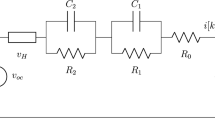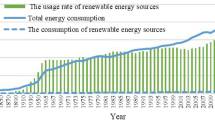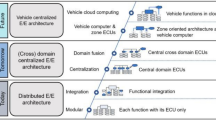Abstract
In hybrid electric vehicles, the energy economy depends on the coordination between the internal combustion engine and the electric machines under the constraint that the total propulsion power satisfies the driver demand power. To optimize this coordination, not only the current power demand but also the future one is needed for real-time distribution decision. This paper presents a prediction-based optimal energy management strategy. Extreme learning machine algorithm is exploited to provide the driver torque demand prediction for realizing the receding horizon optimization. With an industrial used traffic-in-the-loop powertrain simulation platform, an urban driving route scenario is built for the source data collection. Both of one-step-ahead and multi-step-ahead predictions are investigated. The prediction results show that for the three-step-ahead prediction, the 1st step can achieve unbiased estimation and the minimum root-mean-square error can achieve 100, 150 and 160 of the 1st, 2nd and 3rd steps, respectively. Furthermore, integrating with the learning-based prediction, a real-time energy management strategy is designed by solving the receding horizon optimization problem. Simulation results demonstrate the effect of the proposed scheme.





















Similar content being viewed by others
References
Serrao L, Onori S, Rizzoni G (2011) A comparative analysis of energy management strategies for hybrid electric vehicles. ASME J Dyn Syst Meas Control 133(3):031012-1C031012-9
Jiang Q, Ossart F, Marchand C (2017) Comparative study of real-time HEV energy management strategies. IEEE Trans Veh Technol 66(12):10875–10888
Kim N, Rousseau A (2011) Comparison between rule-based and instantaneous optimization for a single-mode, power-split HEV. SAE International 2011-01-0873
Zhang J, Wu Y (2018) A stochastic logical model-based approximate solution for energy management problem of HEVs. Sci China Inf Sci 61(7):070207
Chen Z, Mi C, Xu J et al (2014) Energy management for a power-split plug-in hybrid electric vehicle based on dynamic programming and neural networks. IEEE Trans Veh Technol 63(4):1567–1580
Cairano S, Bernardini D, Bemporad A et al (2014) Stochastic MPC with learning for driver- predictive vehicle control and its application to HEV energy management. IEEE Trans Control Syst Technol 22:1018–1031
Zhang Y, Jiao X, Li L et al (2014) A hybrid dynamic programming-rule based algorithm for real-time energy optimization of plug-in hybrid electric bus. Sci China Technol Sci 57(12):2542–2550
Hellstrom E, Ivarsson M, Aslund J et al (2009) Look-ahead control for heavy trucks to minimize trip time and fuel consumption. Control Eng Pract 17:245–254
Zhang J, Shen T (2016) Real-time fuel economy optimization with nonlinear MPC for PHEVs. IEEE Trans Control Syst Technol 24:2167–2175
Shen T, Kang M, Gao J et al (2018) Challenges and solutions in automotive powertrain systems. J Control Decis 5(1):61–93
Borhan H, Vahidi A, Phillips AM et al (2012) MPC-based energy management of a power-split hybrid electric vehicle. IEEE Trans Control Syst Technol 20(3):593–603
Sun C, Hu X, Moura SJ et al (2015) Velocity predictors for predictive energy management in hybrid electric vehicles. IEEE Trans Control Syst Technol 23(3):1197–1204
Yang J, Zhu G (2015) Adaptive recursive prediction of the desired torque of a hybrid powertrain. IEEE Trans Veh Technol 64(8):3402–3413
Shen X, Zhang J, Shen T (2016) Real-time scenario-based stochastic optimal energy management strategy for HEVs. In: Proceedings of European control conference 2016 (ECC2016), Aalborg, Denmark, pp 631–636
Yang C, Li L, You S et al (2017) Cloud computing-based energy optimization control framework for plug-in hybrid electric bus. Energy 125:11–26
Zhou Y, Ravey A, Péra MC (2019) A survey on driving prediction techniques for predictive energy management of plug-in hybrid electric vehicles. J Power Sour 412:480–495
Moser D, Waschl H, Schmied R et al (2015) Short term prediction of a vehicle’s velocity trajectory using ITS. SAE Int J Passeng Cars Electron Electr Syst 8(2):364–370
Zhang F, Xi J, Langari R (2017) Real-time energy management strategy based on velocity forecasts using V2V and V2I communications. IEEE Trans Intell Transp Syst 18(2):416–430
Feng T, Lin Y, Qing G et al (2015) A Supervisory control strategy for plug-in hybrid electric vehicles based on energy demand prediction and route preview. IEEE Trans Veh Technol 64(5):1691–1700
Cavagnari L, Magni L, Scattolini R (1999) Neural network implementation of nonlinear receding-horizon control. Neural Comput Appl 8(1):86–92
Huang G, Zhu Q, Siew C (2006) Extreme learning machine: theory and applications. Neurocomputing 70(1):489–501
Shen X, Wu Y, Shen T (2018) Logical control scheme with real-time statistical learning for residual gas fraction in IC engines. Sci China Inf Sci 61(1):010203
Eski I, Yildirim S (2017) Neural network-based fuzzy inference system for speed control of heavy duty vehicles with electronic throttle control system. Neural Comput Appl 28(Suppl 1):S907–S916
Wang P, Wong H, Vong C et al (2016) Model predictive engine air-ratio control using online sequential extreme learning machine. Neural Comput Appl 27:79–82
Alireza M, Manzie C, Nesic D (2014) Online optimization of spark advance in alternative fueled engines using extremum seeking control. Control Eng Pract 29:201–211
Zhang Y, Shen X, Shen T (2018) A survey on online learning and optimization for spark advance control of SI engines. Sci China Inf Sci 61(7):70201
Zhang Y, Gao J, Shen T (2017) Probabilistic guaranteed gradient learning-based spark advance self-optimizing control for spark-ignited engines. IEEE Trans Neural Netw Learn Syst 99:1–11
Huang G, Chen L, Siew C (2006) Universal approximation using incremental constructive feedforward networks with random hidden nodes. IEEE Trans Neural Netw 17(4):879–892
Huang G (2015) What are extreme learning machines? Filling the gap between Frank Rosenblatt’s dream and John von Neumann’s puzzle. Cognit Comput 7(3):263–278
Duhoux M, Suykens J, De Moor B, Vandewalle J (2001) Improved long-term temperature prediction by chaining of neural networks. Int J Neural Syst 11(01):1–10
Nguyen H, Chan C (2004) Multiple neural networks for a long term time series forecast. Neural Comput Appl 13(1):90–98
Xu F, Zhang J, Shen T (2018) Putting HEV powertrain dynamics into a road traffic simulation platform. In: JSAE congress (Autumn), Nagoya, Japan, pp 17–19
Acknowledgements
The first author of this work is supported by Foundation of State Key Laboratory of Automotive Simulation and Control under Grant 20161101.
Author information
Authors and Affiliations
Corresponding author
Ethics declarations
Conflict of interest
The authors declared that they have no conflicts of interest to this work and we declare that we do not have any commercial or associative interest that represents a conflict of interest in connection with the work submitted.
Additional information
Publisher's Note
Springer Nature remains neutral with regard to jurisdictional claims in published maps and institutional affiliations.
Rights and permissions
About this article
Cite this article
Zhang, J., Xu, F., Zhang, Y. et al. ELM-based driver torque demand prediction and real-time optimal energy management strategy for HEVs. Neural Comput & Applic 32, 14411–14429 (2020). https://doi.org/10.1007/s00521-019-04240-7
Received:
Accepted:
Published:
Issue Date:
DOI: https://doi.org/10.1007/s00521-019-04240-7




